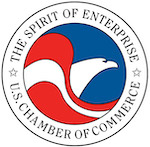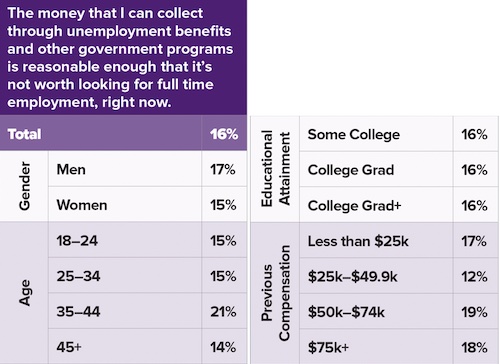 |
Perception tops reality. Fox News and its conservative media echo chamber push the bogus line that out-of-work Americans are deadbeats living the high life thanks to the benevolence of Uncle Sam (e.g., federal supplemental unemployment payments.)
That propaganda has spurred half of America’s states—mostly led by Republican governors—to end the $300 federal supplemental this summer.
They claim the federal benefit encourages slackers to stay at home rather than grab a low-wage job, triggering a labor crunch that is putting the squeeze on corporate America.
The US Chamber of Commerce, which is hardly an ally of working-class America, has shot down the argument that workers are more content to stay at home than report to duty.
It released a poll June 3 of workers who became unemployed during the pandemic and have not yet returned to work.
Only 16 percent of those not actively seeking employment are doing so because the unemployment benefits “make it not worth looking for work.”
The respondents, though, bought into the slacker line.
 |
Nearly three in ten (28 percent) agree “there are a lot of people who are not looking for work because they can do almost or just as well collecting unemployment benefits.”
The Chamber reports that the real reasons that people are leery about returning to work are lack of available jobs in still hard-hit sectors of the economy (28 percent), COVID-19 health concerns (26 percent) and childcare (24 percent).
The COVID-19 pandemic has been a life-changing event for America’s workforce.
The Chamber estimates of the 9.3M unemployed Americans, 2.8M of them will remain on the sidelines this year and 1.2M of them will never return to work.
Federal supplements for the unemployed end Sept. 6. President Biden has no plans to extend the measure.
The million-dollar question: Will Americans flock to the 45M jobs that paid about $750 a week prior to the pandemic, or will businesses be forced to raise wages to attract talent?
CEOs scored PR points during the dark days of COVID-19 by foregoing their salaries to show solidarity with workforces that suffered rounds of layoffs and furloughs.
It was mostly a show, according to the Economic Policy Institute, which found that any cuts by CEOs were largely symbolic.
EPI, which studied the proxy filings of 281 large companies, found the average compensation of CEOs surged 16 percent in 2020, boosted by stock options and vested stock awards.
That compared to a 1.8 percent hike in average worker pay.
CEOs had a better comp year in 2020 than in 2019, where they registered a 14 percent pay boost.
EPI reports the CEO-to-worker compensation ratio jumped from 276.2 in 2019 to 307.3 in 2020. More CEO riches await as the Great Reopening of the US economy unfolds.
Turning a crisis into PR gold. Fastly, the San Francisco internet infrastructure company that was responsible for the screw-up that took down thousands of websites on June 8, averted a PR disaster by quickly taking ownership of the mess and fixing it.
Fastly provides content delivery technology to major players such as the New York Times, CNN, Spotify, BBC and the Financial Times. Each suffered a web outage.
On June 8, Nick Rockwell, Fastly’s senior VP-engineering and infrastructure, not only apologized for “a software bug,” but said the company should have anticipated it.
Within 45 minutes of discovering the problem, 95 percent of Fastly’s customers were back to normal.
“We detected the disruption within one minute, then identified and isolated the cause, and disabled the configuration,” wrote Rockwell on the company’s blog. “This outage was broad and severe, and we’re truly sorry for the impact to our customers and everyone who relies on them.”
Wall Street cheered Fastly’s handling of its crisis by sending its shares up 12.6 percent to $56.20 on its day of potential disaster.
Hats off to Interpublic for being the first ad/PR company to publish its Sustainability Accounting Standards Report as part of its commitment to address environmental, social and governance issues.
CEO Philippe Krakowsky said sustainable transformation is an imperative for Interpublic.
The company understands that to address climate change it must undergo behavioral change, according to Krakowsky. Those changes include travel policies, energy-efficient buildings and responsible consumption while at work whether that’s home-based or in-office.
“We also recognize our special responsibility as a marketing communications company to drive positive change not only on climate, but also on human capital, diversity, equity and inclusion, data ethics and privacy, as well as responsible media and content, which is reflected in our SASB report,” said Krakowsky.
Interpublic also is committed to 100 percent renewable electricity by 2030 for its entire portfolio.


 Southern governors claim they know what's best for their working class, and it's not pay raises... A Ukrainian human rights group played a key role in convincing House Speaker Mike Johnson to hold a vote to send arms to Ukraine, Israel and Taiwan... Trump Media & Technology Group blames short-selling and not lousy outlook for its stock slump.
Southern governors claim they know what's best for their working class, and it's not pay raises... A Ukrainian human rights group played a key role in convincing House Speaker Mike Johnson to hold a vote to send arms to Ukraine, Israel and Taiwan... Trump Media & Technology Group blames short-selling and not lousy outlook for its stock slump. The techniques deployed by OJ Simpson's defense team in the 'trial of the century' served as a harbinger for those used by Donald Trump... People worry about the politicization of medical science just as much as they fret about another pandemic, according to Edelman Trust Barometer... Book bans aren't restricted to red states as deep blue Illinois, Connecticut and Maryland challenged at least 100 titles in 2023.
The techniques deployed by OJ Simpson's defense team in the 'trial of the century' served as a harbinger for those used by Donald Trump... People worry about the politicization of medical science just as much as they fret about another pandemic, according to Edelman Trust Barometer... Book bans aren't restricted to red states as deep blue Illinois, Connecticut and Maryland challenged at least 100 titles in 2023. The NBA, which promotes legalized gambling 24/7, seems more than hypocritical for banning player for placing bets... Diocese of Brooklyn promises to issue press release the next time one of its priests is charged with sexual abuse... Truth Social aspires to be one of Donald Trump's iconic American brands, just like Trump University or Trump Steaks or Trump Ice Cubes.
The NBA, which promotes legalized gambling 24/7, seems more than hypocritical for banning player for placing bets... Diocese of Brooklyn promises to issue press release the next time one of its priests is charged with sexual abuse... Truth Social aspires to be one of Donald Trump's iconic American brands, just like Trump University or Trump Steaks or Trump Ice Cubes. Publicis Groupe CEO Arthur Sadoun puts competition on notice... Macy's throws in the towel as it appoints two directors nominated by its unwanted suitor... The Profile in Wimpery Award goes to the Ford Presidential Foundation for stiffing American hero and former Wyoming Congresswoman Liz Cheney.
Publicis Groupe CEO Arthur Sadoun puts competition on notice... Macy's throws in the towel as it appoints two directors nominated by its unwanted suitor... The Profile in Wimpery Award goes to the Ford Presidential Foundation for stiffing American hero and former Wyoming Congresswoman Liz Cheney. JPMorgan Chase chief Jamie Dimon's "letter to shareholders" is a must-read for PR people and others interested in fixing America and living up to its potential... Get ready for the PPE shortage when the next pandemic hits... Nixing Netanyahu. Gaza carnage turns US opinion against Israel's prime minister.
JPMorgan Chase chief Jamie Dimon's "letter to shareholders" is a must-read for PR people and others interested in fixing America and living up to its potential... Get ready for the PPE shortage when the next pandemic hits... Nixing Netanyahu. Gaza carnage turns US opinion against Israel's prime minister.


 Have a comment? Send it to
Have a comment? Send it to 
No comments have been submitted for this story yet.